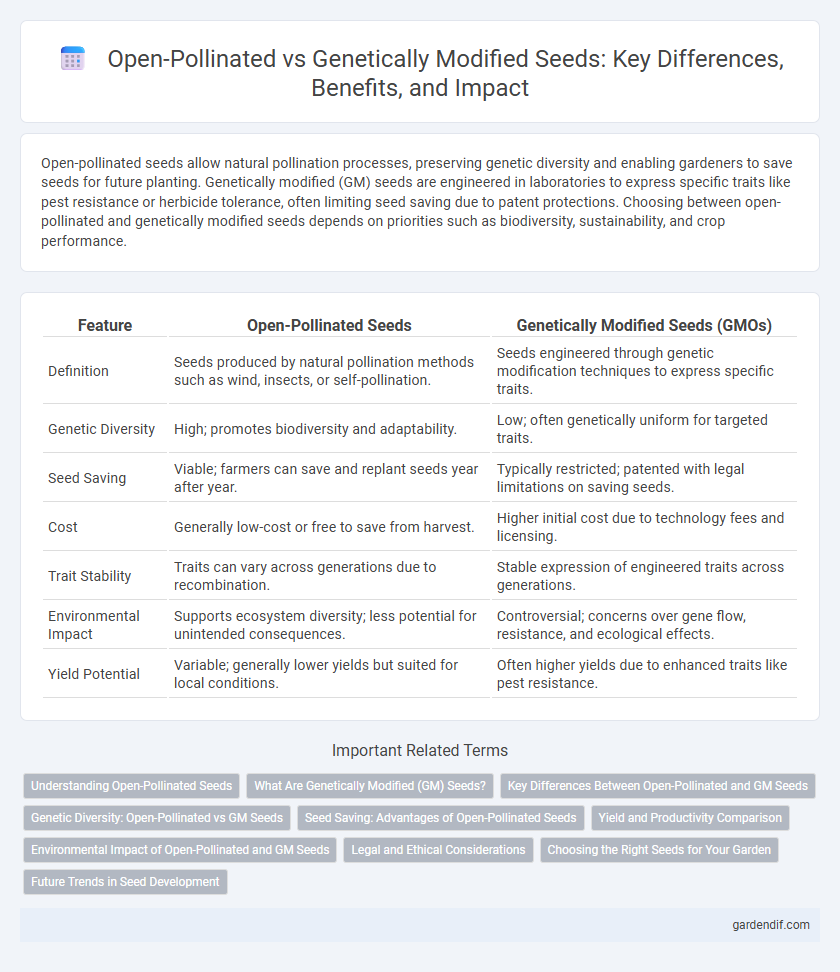
Open-pollinated vs Genetically modified Illustration
Open-pollinated seeds allow natural pollination processes, preserving genetic diversity and enabling gardeners to save seeds for future planting. Genetically modified (GM) seeds are engineered in laboratories to express specific traits like pest resistance or herbicide tolerance, often limiting seed saving due to patent protections. Choosing between open-pollinated and genetically modified seeds depends on priorities such as biodiversity, sustainability, and crop performance.
Table of Comparison
| Feature | Open-Pollinated Seeds | Genetically Modified Seeds (GMOs) |
|---|---|---|
| Definition | Seeds produced by natural pollination methods such as wind, insects, or self-pollination. | Seeds engineered through genetic modification techniques to express specific traits. |
| Genetic Diversity | High; promotes biodiversity and adaptability. | Low; often genetically uniform for targeted traits. |
| Seed Saving | Viable; farmers can save and replant seeds year after year. | Typically restricted; patented with legal limitations on saving seeds. |
| Cost | Generally low-cost or free to save from harvest. | Higher initial cost due to technology fees and licensing. |
| Trait Stability | Traits can vary across generations due to recombination. | Stable expression of engineered traits across generations. |
| Environmental Impact | Supports ecosystem diversity; less potential for unintended consequences. | Controversial; concerns over gene flow, resistance, and ecological effects. |
| Yield Potential | Variable; generally lower yields but suited for local conditions. | Often higher yields due to enhanced traits like pest resistance. |
Understanding Open-Pollinated Seeds
Open-pollinated seeds come from plants naturally fertilized by wind, insects, or other natural mechanisms, preserving genetic diversity and allowing gardeners to save seeds that will grow true to type. Unlike genetically modified seeds, which involve direct manipulation of DNA to exhibit specific traits, open-pollinated seeds maintain natural adaptation and resilience across generations. These seeds are essential for sustainable agriculture and biodiversity, supporting ecosystem balance and farmer sovereignty.
What Are Genetically Modified (GM) Seeds?
Genetically Modified (GM) seeds are engineered by altering the DNA of plants to introduce specific traits such as pest resistance, herbicide tolerance, or increased yield. These seeds differ from open-pollinated seeds, which are naturally cross-pollinated and retain genetic diversity over generations. GM seeds enable precise trait enhancement but often require regulatory approval and may impact biodiversity.
Key Differences Between Open-Pollinated and GM Seeds
Open-pollinated seeds are derived from natural pollination processes, preserving genetic diversity and allowing farmers to save and reuse seeds each season. Genetically modified (GM) seeds contain specific alterations at the DNA level to introduce desirable traits such as pest resistance or herbicide tolerance, which are not achievable through traditional breeding. The key differences lie in genetic stability, seed saving capability, and regulatory frameworks governing their use and distribution.
Genetic Diversity: Open-Pollinated vs GM Seeds
Open-pollinated seeds maintain higher genetic diversity by allowing natural cross-pollination, promoting adaptability to changing environmental conditions. In contrast, genetically modified (GM) seeds often exhibit reduced genetic variation due to engineered traits designed for specific resistance or yield, limiting adaptability. Greater genetic diversity in open-pollinated seeds supports ecosystem resilience and long-term crop sustainability.
Seed Saving: Advantages of Open-Pollinated Seeds
Open-pollinated seeds maintain genetic diversity, enabling gardeners to save seeds from year to year with consistent plant traits, unlike genetically modified seeds that often produce sterile offspring. This natural pollination supports adaptation to local climates and soil conditions, enhancing crop resilience and sustainability. Seed saving from open-pollinated varieties reduces dependency on commercial seed suppliers, promoting food security and preserving heirloom varieties.
Yield and Productivity Comparison
Open-pollinated seeds generally produce stable yields with consistent genetic traits, making them reliable for traditional farming systems. Genetically modified seeds often deliver higher productivity through enhanced resistance to pests and environmental stresses, leading to increased crop yield per hectare. Studies indicate that GM seeds can boost yield by 20-30% compared to open-pollinated varieties, particularly in challenging growing conditions.
Environmental Impact of Open-Pollinated and GM Seeds
Open-pollinated seeds support biodiversity by maintaining genetic variation within crop populations, promoting resilience to pests and environmental changes. Genetically modified (GM) seeds often reduce genetic diversity, potentially leading to ecosystem imbalances and increased vulnerability to diseases. The environmental impact of open-pollinated seeds generally favors sustainable agriculture with lower chemical use, while GM seeds may contribute to heightened herbicide resistance and unintended effects on non-target organisms.
Legal and Ethical Considerations
Open-pollinated seeds are favored legally for their natural reproductive process and farmer rights to save and share seeds without restrictions, contrasting with genetically modified (GM) seeds that are often patented and controlled by corporations, raising intellectual property concerns. Ethical debates around GM seeds include biodiversity loss, potential environmental impacts, and socio-economic disparities due to seed patent enforcement. Regulatory frameworks vary globally, balancing innovation and biosafety while addressing farmer autonomy and food sovereignty issues connected to both seed types.
Choosing the Right Seeds for Your Garden
Open-pollinated seeds preserve genetic diversity and allow gardeners to save seeds from year to year, ensuring adaptability and consistent traits. Genetically modified seeds offer enhanced resistance to pests and diseases, often boosting yield but require purchasing new seeds each season due to patent restrictions. Selecting the right seeds depends on your garden goals, sustainability preference, and willingness to invest in seed renewal versus preserving heirloom varieties.
Future Trends in Seed Development
Future trends in seed development emphasize a balance between open-pollinated varieties and genetically modified organisms (GMOs), driving sustainable agriculture and food security. Advances in gene editing technologies like CRISPR aim to combine the genetic diversity and adaptability of open-pollinated seeds with the precision traits of GMOs, enhancing crop resilience against climate change. Emerging practices also prioritize biodiversity conservation and regulatory frameworks to support innovation while ensuring environmental safety.
Open-pollinated vs Genetically modified Infographic

 gardendif.com
gardendif.com